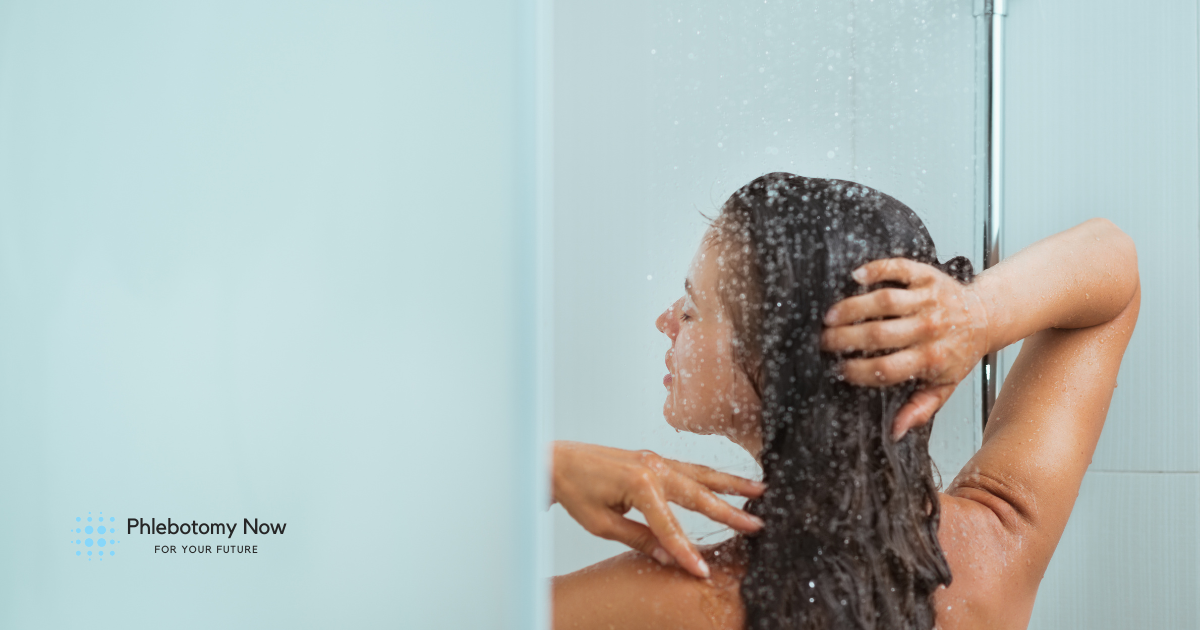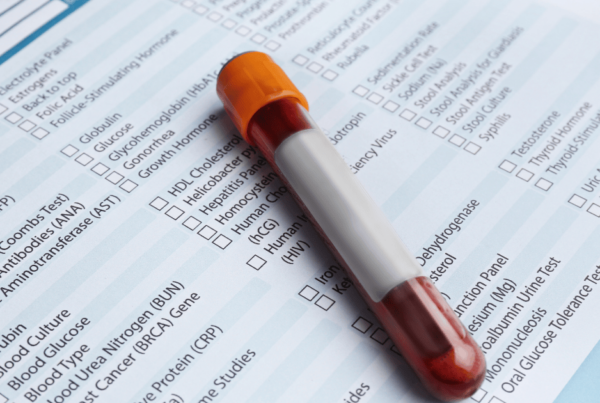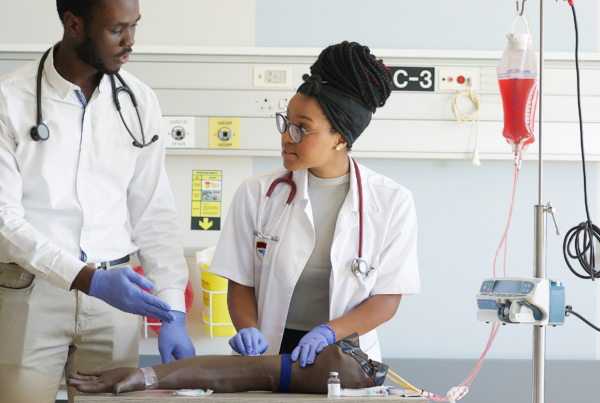Ever heard the rumors about cold showers boosting testosterone? Many people swear by them for a range of health benefits, but do cold showers really increase testosterone? At Phlebotomy Now, we’re dedicated to separating fact from fiction when it comes to your health. Let’s delve into the science behind cold showers and testosterone levels to see if the chill can live up to the hype.
Many people swear by the benefits of cold showers, from boosting energy to improving circulation. However, what does science have to say about these assertions? Let’s delve into the evidence behind the most common cold shower benefits.
| Key Takeaways |
| Testosterone: Cold showers likely have minimal impact on testosterone levels compared to exercise and other lifestyle factors. |
| Fertility: While reducing hot showers might improve sperm quality, there’s no direct evidence cold showers enhance fertility. |
| Energy: Cold showers might increase alertness and energy levels through mechanisms similar to caffeine. |
| Metabolism: Cold exposure can activate brown fat, potentially leading to a healthier metabolism and body composition. |
| Recovery: The evidence on cold showers and post-workout recovery is mixed. They might offer slight benefits, especially when combined with hot water therapy. |
| Immunity: The effects of cold showers on immunity are unclear. However, they might offer a subtle boost by stimulating the immune system and reducing inflammation. |
| Safety: Consult your doctor before taking cold showers if you have high blood pressure, heart conditions, or a compromised immune system. |
| Cold vs. Hot: Opt for lukewarm showers or contrast showers (alternating cold and hot) for a balance of potential benefits. |
| Overall: Cold showers can be a refreshing and potentially beneficial addition to your routine, but they’re not a magic bullet for health. Focus on a holistic approach that includes a healthy diet, exercise, and good sleep habits. |
Cold Showers and Testosterone: Separating Fact from Fiction
A significant portion of research on temperature and testosterone revolves around the testicles and scrotum. The scrotum hangs outside the body to maintain an optimal temperature (around 35 to 37°C or 95 to 98.6°F) for sperm and hormone production.
The theory suggests that cold showers lower scrotal temperature, potentially maximizing sperm and testosterone production. However, research on testosterone production is limited. Studies show cooler testes have a stronger effect on DNA processes, leading to higher sperm volume, quality, and motility.
A 1987 study found optimal DNA, RNA, and protein synthesis occurred when testicular temperature remained between 31 to 37°C (88 to 99°F), promoting better sperm production. Even winter’s colder temperatures were linked to improved sperm morphology (shape) and movement in a 2013 study.
Here’s the caveat: While sperm production and testosterone levels are connected, some evidence suggests the opposite might be true for testosterone. A 1991 study found no link between cold water stimulation and testosterone levels, while physical activity significantly increased them. A 2007 study even suggests brief exposure to cold might decrease testosterone levels in the blood.
The takeaway? Cold showers likely won’t significantly impact testosterone levels compared to exercise. Numerous other factors, like diet and lifestyle choices (smoking, drinking), play a more prominent role. Don’t expect cold showers to be a magic bullet for testosterone.
Do Cold Showers Enhance Fertility?
Let’s explore some research on fertility. A 2007 study demonstrated that reducing frequent exposure to hot water improved sperm count by nearly 500% in some participants.
However, this doesn’t necessarily mean cold showers directly improve fertility. Simply reducing hot showers can boost sperm quality and count since heat, in general, affects sperm production. There’s no current research suggesting a similar relationship between cold water exposure or reduced hot water use and female fertility. The existing research only points towards benefits for males.
Cold Showers and Energy Levels: A Potential Link
Some evidence suggests cold showers might increase energy levels. A 2016 study reported participants feeling more energized after taking hot-to-cold showers for a month, followed by cold showers alone for another two months. They described the feeling as similar to a caffeine effect.
A 2010 study suggests cold water immersion might help reduce the energy your body needs for post-workout recovery by lowering inflammation and increasing blood flow without expending extra energy.
Can Cold Showers Boost Metabolism?
Yes! Brown adipose tissue (BAT), also known as brown fat, is a type of fat present in all humans, regardless of weight. Two studies, one in 2007 and another in 2009, found connections between cold temperatures and BAT activation. They also observed an inverse relationship between brown and white fat (white adipose tissue).
In simpler terms, the more brown fat you have, the more likely you are to have healthy white fat levels and a good body mass index (BMI), a key indicator of overall health.
Do Cold Showers Aid Post-Workout Recovery? The Evidence is Mixed
Cold water might help with faster post-workout recovery, but the effects might be minimal or overstated. A 2010 case report on two athletes (a martial artist and a marathon runner) found cold water immersion potentially reduced pain and tenderness after intense exercise, leading to a quicker return to athletic activities.
However, two other studies (one in 2007 and another in 2016) showed only slight benefits of cold water immersion on muscle soreness recovery. This was especially true when combined with hot water exposure or when done for at least 10 to 15 minutes in water ranging from 52 to 59°F (11 to 15°C).
Do Cold Showers Enhance Immunity? The Picture Isn’t Entirely Clear
Some research suggests cold water exposure might have a subtle, yet unclear, effect on the immune system. A 2014 study demonstrated that cold water immersion triggers the body to release adrenaline. This has two consequences:
- It stimulates the immune system to produce more anti-inflammatory substances.
- It lowers the inflammatory response to infections.
Both these effects can help the body fight off illness. Interestingly, a 2016 study found that cold showers led to a 29% decrease in participants’ work absences. This suggests a potential immune system boost, although the study didn’t show any impact on the duration of illness.
How to Take a Cold Shower for Potential Benefits
Here are some pointers to maximize the potential benefits of cold showers while minimizing any risks:
- Start Gradually: Don’t jump straight into ice-cold water. Gradually adjust the temperature throughout your shower, or make each consecutive shower slightly colder. Begin with warm, then lukewarm, then cool, before transitioning to completely cold.
- Don’t Go All In at Once: Splash some cold water on your hands, feet, and face to acclimate yourself to the temperature instead of shocking your entire body with instant cold.
- Have a Warm Area or Towel Ready: Ensure you can warm up quickly after your shower to prevent shivering.
- Consistency is Key: You likely won’t notice immediate changes. Every day at the same time, take a cold shower to give your body time to acclimate and possibly respond better to regular exposure to cold.
Precautions to Consider Before Taking Cold Showers
Not everyone should jump right into cold showers. Here are some conditions where caution is advised:
- High blood pressure
- Heart conditions or heart disease
- Overheated or feverish (hyperthermia) from illness or intense exercise
- Recently recovered from an illness (flu, cold)
- Compromised immune system due to illness
- Feeling overly exhausted or stressed, as cold showers can add stress to the body
- Depression or mental health conditions (don’t replace medication with cold water therapy)
- Living in a cold climate where exposure to cold water can lead to hypothermia
Cold Showers vs. Hot Showers
Weighing the Pros and Cons
Cold and hot showers offer advantages and disadvantages for your health. Here’s a quick comparison:
Feature |
Cold Showers |
Hot Showers |
|
Pros
|
May reduce itchy skin | Provide relief from respiratory symptoms |
| Increase alertness | Help with blemishes | |
| Improve circulation | Aid in muscle relaxation | |
| Potentially reduce muscle soreness post-workout | ||
| May boost weight loss (indirectly by activating brown fat) | ||
| Glowing hair and skin (anecdotal evidence) | ||
|
Cons
|
Not ideal if already cold | Can dry out and irritate skin |
| May be harsh on the immune system if sick | May worsen some skin conditions | |
| Not a substitute for medical treatment | Increase blood pressure |
So, Cold or Hot? An Ideal Approach Might Exist
Ideally, according to Dr. Friedman, a lukewarm shower is recommended, followed by applying moisturizer to damp skin.
Another option is the contrast shower technique, an age-old method championed by Dr. Sebastian Kneipp. It involves alternating between cold and hot water for one minute each, repeated in cycles for three to five rounds. The health benefits are attributed to the blood vessel constriction caused by cold water, forcing blood to the body’s core, followed by dilation with hot water, pushing the blood back out. This complete circulation cycle is believed to benefit muscle and organ regeneration and detoxification.
Cold Showers and Male Libido: Does the Chill Translate to the Bedroom?
The internet is buzzing about the potential benefits of cold showers, from boosting energy to improving circulation. But can a daily dose of icy water translate to a perkier libido for men? Let’s delve into the science behind cold showers and their impact on male sexual health.
The Testosterone Connection:
A common claim surrounding cold showers is their ability to increase testosterone levels. However, the research presents a mixed picture. Some studies suggest cooler testicular temperatures might enhance sperm production, but the link to testosterone is less clear. While some studies haven’t found a connection, others suggest a temporary decrease in testosterone levels after cold exposure.
So, what does this mean for libido? Testosterone is a crucial player in male sexual function, but it’s not the only factor. Stress, sleep quality, diet, and exercise all play a significant role. While cold showers might not be a magic bullet for boosting testosterone, they can contribute to a healthier lifestyle, which indirectly benefits libido.
Beyond Testosterone: The Perks of Cold Showers
Even if the testosterone link remains inconclusive, cold showers offer other potential benefits that can enhance sexual well-being:
- Improved Circulation: Cold water exposure can stimulate circulation, potentially leading to better blood flow throughout the body, including the genitals. This can contribute to firmer erections.
- Enhanced Mood: Cold showers might trigger the release of endorphins, the body’s natural mood elevators. Feeling good and energized can translate to a more positive outlook on intimacy.
- Stress Reduction: The shock of cold water can have a startling effect, momentarily taking your mind off daily worries. This brief escape from stress can be beneficial for sexual function, as stress is a known libido killer.
Cold Showers vs. Ice Baths: Striking the Right Balance
While cold showers can be invigorating, some men might consider a more intense approach – ice baths. Here’s the key difference:
- Cold Showers: More accessible and easier to incorporate into a daily routine. The water temperature is typically above 50°F (10°C).
- Ice Baths: More extreme, with water temperatures ranging from 41°F to 50°F (5°C to 10°C). While some studies suggest benefits for recovery and circulation, ice baths can be a shock to the system and aren’t recommended for everyone.
Cold Showers and Your Libido: The Final Splash
Cold showers offer a range of potential health benefits, and while the direct impact on testosterone might be minimal, they can contribute to a healthier lifestyle that indirectly supports a healthy libido. Focus on incorporating cold showers into a routine that includes a balanced diet, regular exercise, and quality sleep for optimal sexual health.
Remember: If you have any underlying health conditions, consult your doctor before starting cold showers.
Ready to take the plunge? Take a cold shower to start, then progressively turn the heat down. Listen to your body and adjust accordingly. You might be surprised by the refreshing (and potentially libido-boosting) effects!
Conclusion: Cold Showers Offer Potential Benefits, But Not a Miracle Cure
Cold showers can provide various benefits, including increased endorphins, improved metabolism, and enhanced circulation. They might also help fight off common illnesses. However, it’s crucial to remember that cold showers are not a cure-all for any medical condition. They should be used as a complementary approach alongside traditional treatments, not as a replacement.
If you’re considering incorporating cold showers into your routine, start gradually, listen to your body, and address any concerns with your doctor, especially if you have any pre-existing health conditions.
By following these tips and basing your decision on scientific evidence, you can determine if cold showers are a beneficial addition to your overall wellness strategy.
FAQs for Cold Showers and Your Health: Separating Fact from Fiction
Does taking cold showers actually boost testosterone levels?
There’s limited evidence to support this claim. While cooler testes might improve sperm production, research on testosterone is inconclusive. Some studies suggest a temporary decrease after cold exposure. Focus on exercise and a healthy lifestyle for a more significant testosterone boost.
Can cold showers improve fertility?
While reducing hot showers might benefit sperm quality, there’s no direct link between cold showers and fertility. Existing research only points towards potential benefits for males.
Do cold showers really give you more energy?
Some evidence suggests a link. Studies report participants feeling more energized after cold showers, similar to a caffeine effect.
Can cold showers help with weight loss?
Cold exposure can activate brown fat, which burns calories and may contribute to a healthier metabolism.
Are cold showers good for muscle recovery after exercise?
The research is mixed. Cold water might offer slight benefits, especially when combined with hot water therapy.
Do cold showers strengthen your immune system?
The effects are unclear. Cold water might stimulate the immune system and reduce inflammation, but more research is needed.
How can I take a cold shower safely and maximize the benefits?
- Gradually decrease the water temperature over time.
- Start with splashes on your hands, feet, and face to adjust.
- Have a warm area or towel ready to prevent shivering.
- Consistency is key – take cold showers daily for potential benefits.
Who should avoid cold showers?
People with high blood pressure, heart conditions, compromised immune systems, or feeling overly stressed/exhausted should avoid cold showers.
Cold showers vs. hot showers: which is better?
Ideally, take lukewarm showers and moisturize your skin afterward. Consider contrast showers (alternating hot and cold) for potential circulation benefits.
Can cold showers improve libido?
The link between cold showers and testosterone (important for libido) is weak. However, cold showers might improve circulation, mood, and stress reduction, all of which can indirectly benefit libido.
Cold showers vs. ice baths: what’s the difference?
Cold showers are milder (above 50°F) and easier to incorporate daily. Ice baths are more extreme (41-50°F) and not for everyone.
The verdict on cold showers?
Cold showers offer potential benefits like increased alertness and circulation, but they’re not a miracle cure. Use them as a complementary approach to a healthy lifestyle. Consult your doctor before starting if you have any health concerns.
Thanks for reading! At Phlebotomy Now, we empower you with knowledge.
We believe that informed decisions are the best decisions, especially when it comes to your health. That’s why we strive to provide you with the most up-to-date, evidence-based information on a variety of health topics.
If you have any questions or concerns, please don’t hesitate to reach out to a qualified healthcare professional. You can also visit our website for more informative articles like this one.
Remember, we’re here to help you on your journey to optimal health and wellness.
If you have any questions or concerns about your specific health needs, please don’t hesitate to contact a qualified healthcare professional.







